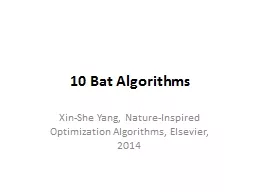PDF-Survey of web crawling algorithms
Author : pasty-toler | Published Date : 2017-03-31
Advances in Vision Computing An International Journal AVC Vol1 No23 September 2014 Figure1 Architecture of Crawler Researchers are developing new scheduling policy
Presentation Embed Code
Download Presentation
Download Presentation The PPT/PDF document "Survey of web crawling algorithms" is the property of its rightful owner. Permission is granted to download and print the materials on this website for personal, non-commercial use only, and to display it on your personal computer provided you do not modify the materials and that you retain all copyright notices contained in the materials. By downloading content from our website, you accept the terms of this agreement.
Survey of web crawling algorithms: Transcript
Download Rules Of Document
"Survey of web crawling algorithms"The content belongs to its owner. You may download and print it for personal use, without modification, and keep all copyright notices. By downloading, you agree to these terms.
Related Documents














